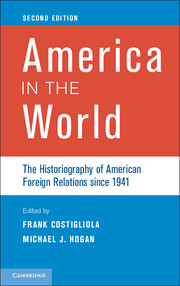Book contents
- Frontmatter
- Dedication
- Contents
- List of Contributors
- Preface
- 1 Introduction
- 2 The Charlie Maier Scare and the Historiography of American Foreign Relations, 1959–1980
- 3 Chaps Having Flaps: The Historiography of U.S. Foreign Relations, 1980–1995
- 4 Still Contested and Colonized Ground: Post–Cold War Interpretations of U.S. Foreign Relations during World War II
- 5 Recent Literature on Truman’s Atomic Bomb Decision
- 6 The Cold War
- 7 Cold War Presidents: Dwight D. Eisenhower, John F. Kennedy, Lyndon Baines Johnson, and Richard M. Nixon
- 8 The War that Never Ends: Historians and the Vietnam War
- 9 Culture and the Cold War: U.S.–Latin American Historiography since 1995
- 10 Impatient Crusaders: The Making of America’s Informal Empire in the Middle East
- 11 Explaining the Rise to Global Power
- 12 Bringing the Non-State Back In
- 13 Technology and the Environment in the Global Economy
- 14 U.S. Mass Consumerism in Transnational Perspective
- 15 A Worldly Tale
- Index
- References
9 - Culture and the Cold War: U.S.–Latin American Historiography since 1995
Published online by Cambridge University Press: 05 June 2014
- Frontmatter
- Dedication
- Contents
- List of Contributors
- Preface
- 1 Introduction
- 2 The Charlie Maier Scare and the Historiography of American Foreign Relations, 1959–1980
- 3 Chaps Having Flaps: The Historiography of U.S. Foreign Relations, 1980–1995
- 4 Still Contested and Colonized Ground: Post–Cold War Interpretations of U.S. Foreign Relations during World War II
- 5 Recent Literature on Truman’s Atomic Bomb Decision
- 6 The Cold War
- 7 Cold War Presidents: Dwight D. Eisenhower, John F. Kennedy, Lyndon Baines Johnson, and Richard M. Nixon
- 8 The War that Never Ends: Historians and the Vietnam War
- 9 Culture and the Cold War: U.S.–Latin American Historiography since 1995
- 10 Impatient Crusaders: The Making of America’s Informal Empire in the Middle East
- 11 Explaining the Rise to Global Power
- 12 Bringing the Non-State Back In
- 13 Technology and the Environment in the Global Economy
- 14 U.S. Mass Consumerism in Transnational Perspective
- 15 A Worldly Tale
- Index
- References
Summary
Although U.S. attention toward Latin America has been more or less on the diplomatic backburner since this essay’s first incarnation in 1995, scholars have been giving the subject plenty of attention. Indeed, recent studies have used innovative ways to more deeply understand both the nature of the relationship between the so-called “Colossus of the North” and its hemispheric neighbors, as well as the broader consequences of those engagements. Their discoveries have substantially revised the older, traditional accounts of that relationship. The original version of this essay recognized that the “grand narrative” of U.S.-Latin American relations – which focused on state-to-state relationships, relied heavily if not exclusively on documentation in U.S. archives and emphasized the centrality of Washington’s benevolence – was giving way to more sophisticated and incisive approaches. Those efforts explored U.S. goals and methods more completely, incorporated Latin American views more fully, and gave greater weight to issues of culture, including how elements such as race, gender, and identity informed the logic and assumptions of historical actors. This revision will build on the original critique by concentrating on how the early efforts to frame a new approach have progressed since the mid-1990s.
- Type
- Chapter
- Information
- America in the WorldThe Historiography of American Foreign Relations since 1941, pp. 188 - 211Publisher: Cambridge University PressPrint publication year: 2013
References
- 1
- Cited by



